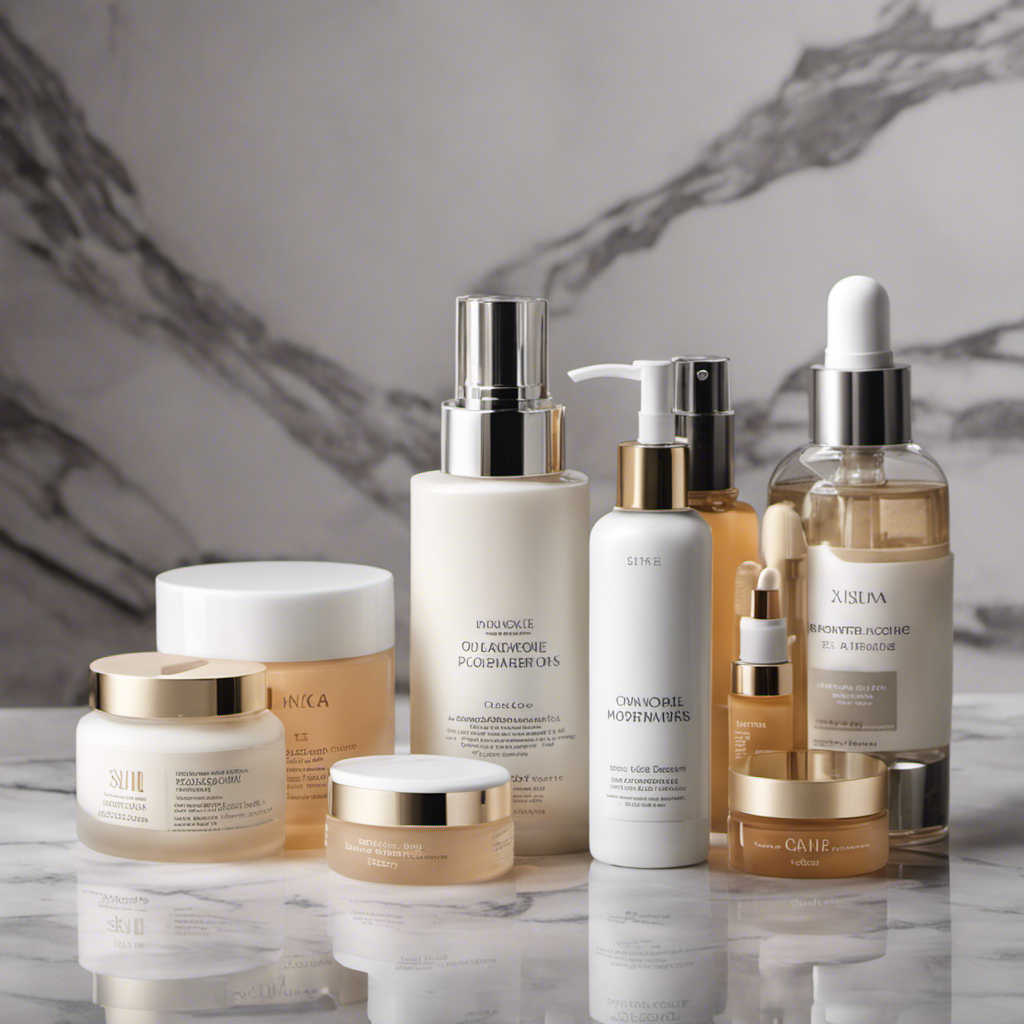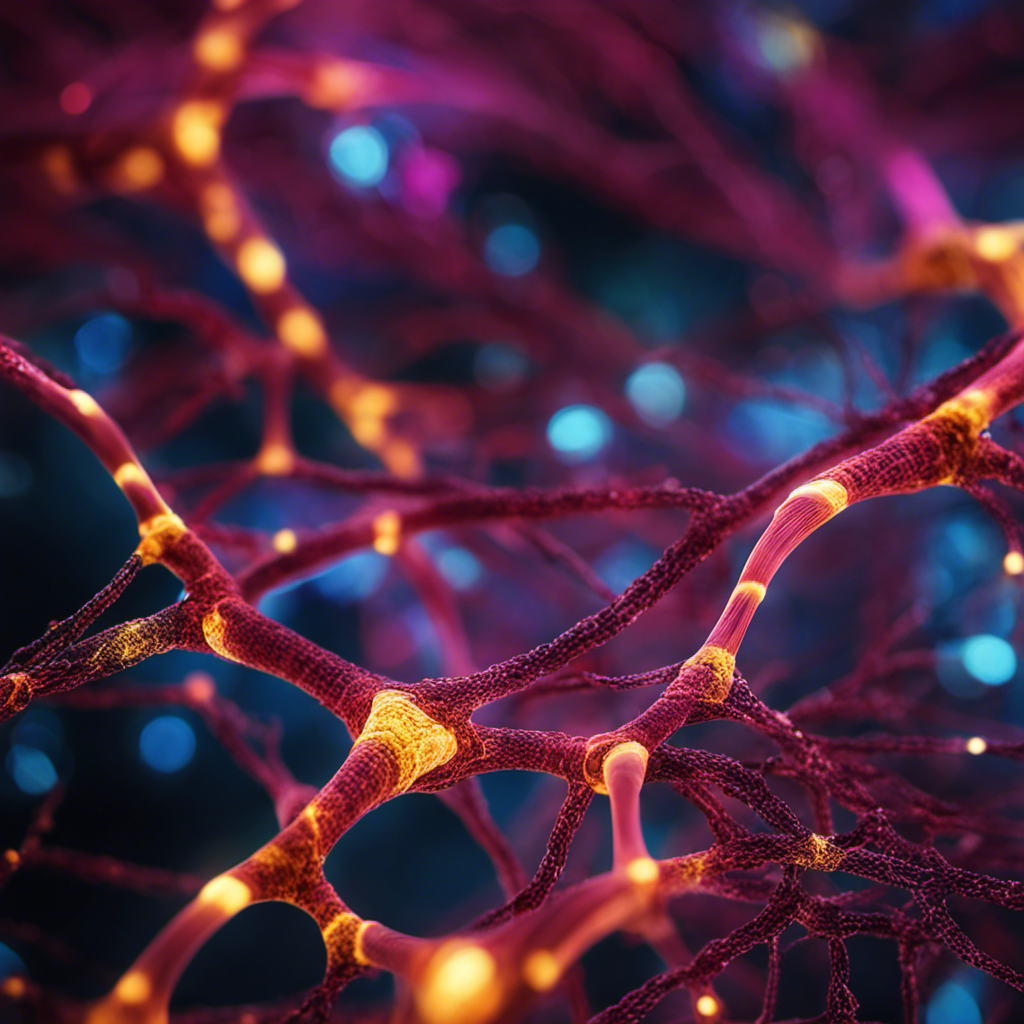Are you curious about how to take better care of your skin? Well, look no further! In this article, we’ll explore some fun facts about skin care that will leave you feeling informed and ready to pamper yourself.
From debunking skincare myths to uncovering the surprising benefits of facial massage, we’ve got all the insider knowledge you need.
So, sit back, relax, and get ready to discover the secrets to achieving healthy and glowing skin.
Key Takeaways
- The skin microbiome is essential for maintaining healthy skin and plays a role in protecting against harmful pathogens, regulating moisture levels, and influencing the immune system.
- Understanding different skin types is important for choosing the right skincare products and routines. Oily skin does not always mean it is prone to acne, and dry skin still needs moisturizer to stay hydrated.
- Excess sebum production and clogged pores contribute to acne formation, and certain factors like hormones and diet can worsen acne symptoms. A diet rich in fruits, vegetables, and whole grains can help reduce acne symptoms.
- Wearing sunscreen regularly is crucial for protecting the skin from harmful UV rays. Choose a broad-spectrum sunscreen with an SPF of 30 or higher, apply generously, and reapply every two hours or after swimming or sweating heavily. Seek shade and wear protective clothing for further sun protection.
The Largest Organ: Your Skin
Did you know that your skin is the largest organ in your body? It’s true! Your skin covers an area of about 20 square feet and weighs around six pounds.
But did you also know that your skin is home to trillions of microorganisms known as the skin microbiome? These tiny organisms play a crucial role in maintaining the health and balance of your skin. They help protect against harmful pathogens, regulate moisture levels, and even influence your immune system.
That’s why taking care of your skin is so important. Establishing a regular skincare routine can help nourish and support this delicate ecosystem, keeping your skin healthy and radiant.
So remember, next time you think about skincare, don’t forget to give some love to the amazing world of your skin microbiome!
Skin Types: More Than Just Dry or Oily
When it comes to skincare, there’s more to skin types than just being dry or oily. It’s important to understand your skin type accurately in order to choose the right products and treatments that will give you the best results.
Here are some common misconceptions about skin types and how to identify them accurately:
- Misconception 1: All oily skin is acne-prone
- Not all oily skin is prone to acne; it could be due to genetics or hormonal factors.
- Look for other signs of acne-prone skin like frequent breakouts and clogged pores.
- Misconception 2: Dry skin doesn’t need moisturizer
- Even if you have dry skin, it still needs moisture to stay hydrated.
- Opt for a rich, hydrating moisturizer that nourishes your skin without clogging pores.
The Science Behind Acne
To understand the science behind acne, it’s important for you to know how excess sebum production and clogged pores contribute to the formation of pimples. Your hormones play a significant role in this process.
During puberty, your body produces an increased amount of hormones known as androgens. These hormones stimulate your oil glands to produce more sebum, which can lead to oily skin and clogged pores.
Additionally, certain foods can impact the severity of acne breakouts. High glycemic foods like sugary snacks and refined carbohydrates can cause your blood sugar levels to spike, triggering inflammation and increasing oil production. On the other hand, a diet rich in fruits, vegetables, and whole grains may help reduce acne symptoms by providing essential nutrients that support healthy skin function.
Understanding these factors can empower you to make informed choices regarding your skincare routine and diet, ultimately promoting clearer skin.
Sunscreen: Your Skin’s Best Friend
Wearing sunscreen regularly is essential for protecting your skin from harmful UV rays. But applying sunscreen properly is just as important as using it.
To ensure maximum protection, follow these sun protection tips:
- First, choose a broad-spectrum sunscreen with an SPF of 30 or higher to shield your skin against both UVA and UVB rays.
- Next, apply it generously to all exposed areas of the body at least 15 minutes before going outside. Don’t forget commonly overlooked areas like the ears, back of the neck, and tops of feet.
- Reapply every two hours or immediately after swimming or sweating heavily.
Remember, sunscreen alone isn’t enough; seek shade during peak sun hours and wear protective clothing to further safeguard your skin from sun damage.
So slather on that sunscreen and enjoy the sunshine while keeping your precious skin safe!
The Myth of “Detoxing” Your Skin
You’ve probably heard the buzz about detoxing your skin, but it’s time to debunk some myths.
Contrary to popular belief, there is no scientific evidence that supports the idea of detoxing your skin. In fact, attempting to do so can actually have harmful effects on your skin health.
Detoxing Skin: Debunking Myths
Contrary to popular belief, detoxing your skin is not necessary for maintaining a healthy complexion. The process of detoxing skin involves using products or treatments that claim to remove toxins and impurities from the skin. However, it’s important to understand the truth behind this skincare trend.
Here are some key points to consider:
- Detoxing skin: understanding the process:
Detoxifying masks and cleansers often contain ingredients like charcoal or clay that can help absorb excess oil and unclog pores. Some treatments may involve steam or exfoliation to promote blood circulation and cell turnover. - Detoxing skin: pros and cons:
Pros: Can temporarily improve the appearance of the skin by removing surface impurities.
Cons: Excessive use of detoxifying products can disrupt the natural balance of the skin and lead to dryness or irritation.
Harmful Effects of Detoxing
Using excessive detoxifying products can disrupt the natural balance of your skin and lead to dryness or irritation.
While detoxing is often seen as a way to achieve clear and radiant skin, it’s important to understand the dangers of extreme detoxing and its impact on your skin.
Detoxing involves using harsh ingredients that strip away the natural oils, leaving your skin vulnerable and prone to damage. This can result in redness, flakiness, and even breakouts.
Instead of relying on aggressive detoxes, focus on gentle cleansing methods that maintain the pH balance of your skin. Opt for a balanced skincare routine that includes nourishing moisturizers and protective sunscreens.
The Truth About Aging: Genetics Vs. Lifestyle
If you take care of your skin by practicing a healthy lifestyle, it can have a significant impact on delaying the effects of aging, regardless of your genetic predisposition.
Genetics definitely play a role in how our skin ages, but that doesn’t mean we’re powerless against it. Your skincare routine and overall lifestyle choices can greatly influence the way your skin ages.
By adopting good habits such as protecting your skin from the sun, eating a balanced diet, staying hydrated, getting enough sleep, and managing stress levels effectively, you can slow down the signs of aging.
These lifestyle factors have a direct impact on the health and appearance of your skin. So don’t underestimate the power you have to maintain youthful-looking skin for longer – it’s all about taking care of yourself from within!
The Role of Diet in Skin Health
Did you know that what you eat can have a direct impact on the health and appearance of your skin? It’s true, there is a strong connection between food and complexion.
Certain nutrients are essential for maintaining radiant skin, so it’s important to pay attention to your diet if you want to achieve that healthy glow.
Food and Complexion Connection
The food you eat can have a direct impact on your complexion. It’s not just about what skincare products you use, but also about nourishing your body from the inside out. Here are three ways that food can affect your skin:
- Food and gut health: Your gut is home to trillions of bacteria that play a crucial role in nutrient absorption and immune function. When your gut is healthy, it reflects on your skin, making it clearer and more radiant.
- Hormonal balance and skin: Certain foods can help regulate hormonal imbalances that often lead to acne breakouts. Foods rich in omega-3 fatty acids, like salmon and walnuts, can reduce inflammation and promote hormone balance.
- Nutrient-rich foods for glowing skin: Eating a diet high in fruits, vegetables, whole grains, and lean proteins provides essential vitamins and minerals that support healthy skin cells’ growth and repair.
Nutrients for Radiant Skin
Eating a diet rich in fruits and vegetables can give your skin a radiant glow. But did you know that certain nutrients are essential for achieving that healthy, glowing complexion? Incorporating these nutrients into your skincare routine can make a world of difference.
Vitamin C, found in citrus fruits and berries, helps to brighten the skin and reduce signs of aging. Omega-3 fatty acids, found in fatty fish like salmon and walnuts, help to hydrate the skin from within and maintain its elasticity. Zinc, present in foods like oysters and pumpkin seeds, aids in cell repair and keeps acne at bay. And let’s not forget about antioxidants! These powerful compounds, found in green tea and dark chocolate, protect the skin from harmful free radicals.
So next time you’re planning your meals or shopping for skincare products, remember to include these nutrient-rich essentials for that coveted radiant glow!
The Power of Exfoliation
Exfoliating regularly can help reveal smoother and brighter skin. By removing dead skin cells, exfoliation promotes cell turnover, unclogs pores, and improves the effectiveness of skincare products. There are different types of exfoliants available, each with its own benefits.
Here’s a table that provides an overview of the benefits and types of exfoliants:
| Benefits | Types |
|---|---|
| Removes dead skin cells | Physical Exfoliants |
| Improves skin texture | Chemical Exfoliants |
| Unclogs pores | Enzyme-based Exfoliants |
Physical exfoliants include scrubs or brushes that physically remove dead skin cells. Chemical exfoliants contain ingredients like AHAs or BHAs to dissolve dead skin cells. Enzyme-based exfoliants use natural enzymes to gently slough off dead skin.
The Importance of Hydration
Now that you’ve learned about the power of exfoliation, let’s dive into another crucial aspect of skincare: hydration. Taking care of your skin involves more than just scrubbing away dead cells; it also requires keeping your skin hydrated and nourished.
Here are three reasons why hydration is essential for healthy, glowing skin:
- Drinking water: Staying hydrated from within by drinking enough water helps maintain the moisture balance in your body, which directly affects your skin’s health and appearance.
- Hydrating ingredients: Look out for skincare products that contain hydrating ingredients like hyaluronic acid, glycerin, or ceramides. These ingredients help attract and retain moisture in the skin, keeping it plump and supple.
- Preventing dryness: Proper hydration helps prevent dryness, flakiness, and dullness in your skin. By replenishing moisture levels, you can achieve a smoother complexion with a radiant glow.
Remember to drink plenty of water and choose skincare products with hydrating properties to give your skin the love and care it deserves!
Stress and Your Skin: A Complex Relationship
Feeling stressed? Your skin might be feeling it too. Stress-induced breakouts, like pesky pimples and blemishes, can make an unwelcome appearance when you’re under pressure.
Plus, stress can also affect your skin’s sensitivity, making it more prone to irritation and redness. But don’t fret! There are ways to manage stress for better skin health, and we’ll explore them in this discussion.
Stress-Induced Breakouts
Did you know that stress can cause breakouts on your skin? It’s true! When you’re stressed, your body releases hormones like cortisol, which can lead to an increase in oil production and inflammation. This hormonal imbalance can trigger pesky pimples and acne flare-ups. But don’t worry, there are ways to manage stress and keep your skin clear. Take a look at the table below for some helpful tips:
| Stress Management | Hormonal Imbalance |
|---|---|
| Practice relaxation techniques such as deep breathing or meditation | Maintain a balanced diet with plenty of fruits and vegetables |
| Engage in regular exercise to reduce stress levels | Get enough sleep to regulate hormone production |
| Seek support from friends, family, or professional counselors | Avoid excessive caffeine and sugar intake |
Skin Sensitivity and Stress
When you’re stressed, your skin can become more sensitive and prone to irritation. Stress-related skin conditions are common and can manifest in various ways.
Here are some interesting facts about the causes of skin sensitivity and stress-related skin conditions:
- Hormonal imbalance: Stress triggers the release of cortisol, a hormone that disrupts the balance of other hormones in your body. This hormonal imbalance can lead to increased skin sensitivity.
- Weakened immune system: Chronic stress weakens your immune system, making your skin more vulnerable to environmental irritants and allergens.
- Inflammation: Stress promotes inflammation throughout the body, including the skin. This inflammation can exacerbate existing skin conditions or even cause new ones to develop.
Understanding these connections between stress and skin sensitivity is crucial for managing your overall well-being. By implementing stress-reducing techniques like exercise, meditation, and self-care practices, you can help maintain healthier and happier skin.
Managing Stress for Skin
To manage stress for healthier skin, you can incorporate relaxation techniques like deep breathing and mindfulness into your daily routine. Stress management techniques play a crucial role in maintaining skin health as stress can have a significant impact on your skin.
When you are stressed, your body releases hormones like cortisol, which can lead to increased oil production, breakouts, and even exacerbate existing skin conditions such as eczema or psoriasis. By incorporating relaxation techniques into your daily routine, you can reduce stress levels and minimize its effects on your skin.
Deep breathing exercises help calm the mind and promote oxygen flow to the skin, while mindfulness practices allow you to focus on the present moment and let go of stressful thoughts. Taking time for yourself each day to engage in these stress management techniques will not only benefit your overall well-being but also contribute to healthier and more radiant skin.
Debunking Skincare Myths
You might be surprised to learn that some skincare myths you’ve believed all along are actually not true. It’s time to debunk those skincare fads and separate fact from fiction. Here are the top four misconceptions about skincare:
- Myth: The more products you use, the better your skin will look.
Reality: Using too many products can overwhelm your skin and lead to irritation. Stick to a simple routine with high-quality products. - Myth: Sunscreen is only necessary on sunny days.
Reality: UV rays are present even on cloudy or rainy days. Protect your skin every day by wearing sunscreen with at least SPF 30. - Myth: You don’t need moisturizer if you have oily skin.
Reality: All skin types need hydration, including oily skin. Look for lightweight, oil-free moisturizers that won’t clog pores. - Myth: Natural ingredients are always better for your skin.
Reality: While some natural ingredients can be beneficial, not all of them are suitable for everyone’s skin type. Focus on finding products that work well for your specific needs.
The Surprising Benefits of Facial Massage
Take a moment to relax and indulge in a facial massage, as it can provide surprising benefits for your overall well-being.
Not only does it feel incredibly soothing, but it also has numerous advantages for your skin and mental health.
Facial massage techniques, such as acupressure, can help improve blood circulation, which promotes a healthy glow and reduces puffiness.
Additionally, the gentle pressure applied during a facial massage can stimulate collagen production, leading to firmer and more youthful-looking skin.
Beyond the physical benefits, facial massages have been known to alleviate stress and tension, helping you feel more relaxed and rejuvenated.
Incorporating regular facial massages into your self-care routine is an excellent way to show love to yourself and enhance your sense of belonging in your own skin.
The Dangers of DIY Skincare
When attempting to create your own skincare products, it’s important to be aware of the potential dangers that can arise from using improper ingredients or techniques. Here are some things you should keep in mind:
- Dangers of homemade skincare:
- Improper preservation: Homemade products may not contain preservatives, increasing the risk of bacterial growth and contamination.
- Lack of expertise: DIY recipes found on the internet may not undergo rigorous testing, leading to ineffective or harmful formulations.
- Risks of using expired skincare products:
- Reduced efficacy: Expired products may lose their effectiveness over time, resulting in wasted time and money.
- Skin irritation: Expired products can cause allergic reactions, breakouts, or irritation due to changes in their chemical composition.
Skincare Ingredients to Avoid
Now that you know the risks of DIY skincare, let’s talk about harmful skincare ingredients you should avoid.
Your skin is precious, and it deserves only the best. Many commercial products contain harsh chemicals like parabens, sulfates, and phthalates. These ingredients can strip your skin of its natural oils, irritate it, and even disrupt your hormonal balance.
But don’t worry! There are natural skincare alternatives that will keep your skin healthy and radiant. Look for products with ingredients like aloe vera, tea tree oil, shea butter, and jojoba oil. These natural wonders soothe inflammation, hydrate your skin deeply, and provide essential nutrients without any harmful side effects.
Remember to read labels carefully and choose wisely for a skincare routine that promotes both beauty and well-being.
Frequently Asked Questions
Can Certain Foods or Drinks Improve the Health of Your Skin?
Certain foods and drinks can indeed improve the health of your skin. They provide essential nutrients, antioxidants, and hydration that promote a clear complexion and youthful glow. Incorporating these into your diet can work wonders for your skin.
What Are Some Common Skincare Myths and Misconceptions?
Common skincare myths and misconceptions can lead to improper care of your skin. One myth is that sunscreen is only necessary on sunny days. Another misconception is that a consistent skincare routine isn’t important.
Is It True That Certain Skincare Ingredients Can Be Harmful to Your Skin?
Yes, certain skincare ingredients can be harmful to your skin. Some may cause irritation or allergic reactions in individuals with skincare allergies. It’s important to read labels and consult a dermatologist if you have any concerns.
How Does Stress Affect the Health and Appearance of Your Skin?
Stress can negatively impact your skin’s health and appearance. It can trigger breakouts, increase oil production, and worsen conditions like eczema. Managing stress through relaxation techniques and a consistent skincare routine is essential for maintaining healthy skin.
What Are the Potential Dangers of Creating Your Own Skincare Products at Home?
Creating your own skincare products at home can be risky. Potential dangers include ineffective formulations, incorrect measurements, and the risk of contamination. It’s important to prioritize safety and consult professionals for guidance.
Conclusion
In conclusion, taking care of your skin is crucial for its overall health and appearance. By understanding the different types of skin and the science behind common skincare issues like acne, you can make informed decisions about which products to use.
Remember that sunscreen is essential in protecting your skin from harmful UV rays. Don’t fall for the myth of detoxing your skin, as it is not scientifically proven. Be aware of skincare myths and always research before trying DIY treatments.
Lastly, avoid harmful skincare ingredients to ensure optimal skin health. Your skin deserves the best care possible!





